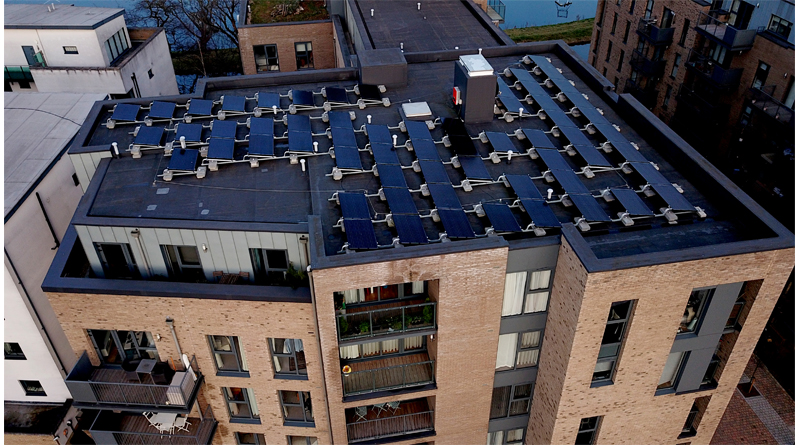

On Sunday (13th May 2018) Delhi Chief Minister Arvind Kejriwal inaugurated a 141kWp solar PV plant at the Milan Vihar cooperative housing society in East Delhi, making it the second housing society after the Shiv Bhole cooperative housing society in Dwarka, to go live as part of Delhi’s Solar Policy 2016-20.
This marks a welcome demonstration of the government’s resolve and ability to actually get things moving on the ground, even as the Capital remains well behind on its solar potential and ambitions.
As per the official statement, the plant has the capacity to generate 1.8 lakh units per year at the average rate of Rs.2.50 per unit for each of the 1600 residents living in approximately 400 flats.
The 441 solar panels across the society roofs are set up under the Renewable Energy Service Company (RECO) model, under which the cost of installation is borne by a private company. As per the agreement the company would also be responsible for generating electricity at the rate Rs.4.66 per unit for 25 years. The Delhi Government will further provide a subsidy of Rs.2 (30% of the cost), making the electricity available to the people at an average rate of Rs.2.66 per unit. The cost of setting up this particular solar plant was Rs.77 lakhs. Or approx. Rs 55,000 per KwH. With typically 3 panels per KW.
Deputy CM Manish Sisodia, who attended the event, said, “The main reason why many people do not opt for solar plants is that the cost of installation is very high. The government, therefore, has initiated this scheme where people do not have to pay for installation.”
In addition, the Delhi government, Indraprastha Power Generation Co. Ltd and Energy Efficiency & Renewable Energy Management Centre (EEREM) have signed an agreement to make sure the electricity is provided at the same rate for 25 years.
The residents are to be billed only for their net energy consumption and not the net energy production, the excess energy produced is to be sent back to the grid. Furthermore, the government plans to offer credits to the residents who manage to give back to the grid. Since the solar plants do not contain storage facilities the residential areas are to maintain their BSES connections for constant power supply.
With a total of 1365 rooftop solar systems installed, Delhi currently has the most number of rooftop solar systems as compared to any other state. The total installed capacity is at 90MWp out of which 5MWp has been installed in the domestic sector.
The Delhi Solar policy under which the project was promoted, has a target set for installing 1000MWp of rooftop solar power by 2020 and 2000MWp by 2025, which would account for 14% of peak load & 4% of the energy demand and 21% of peak load & 7% of total energy demand, respectively.
The policy focuses on generating an investment climate to enable multiple financial models, from self-owned (CAPEX) or third party owners (RESCO) models. It mandates all government buildings with a rooftop area of 500m2 or above to install the systems by 2020. It also states that the Discoms should meet 75% minimum, of their solar renewable purchase obligation (RPO) in Delhi.
The key highlights of the policy include: –
The Indian Federation of Green Energy (IFGE) and the Embassy of Nepal have jointly organized…
Saudi Arabia’s Forward7 Initiative—formerly known as the Clean Fuel Solutions for Cooking Initiative—has collaborated with…
In a significant move toward advancing green energy and industrial growth in the state, Himachal…
Golabl chemical conglomerate BASF has announced that its now offering the world’s first biomass-balanced polyethersulfone…
In a crucial stint to bolster the biogas sector and sustainable dairying in the country,…
TotalEnergies SE has received approval to proceed with its Middlebrook solar and battery project in…